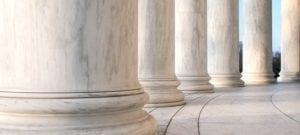 In Obduskey v. McCarthy & Holthus, LLP, 2019 WL 1264579, ___ S. Ct. ___, (Mar. 20, 2019), the United States Supreme Court unanimously held that the Fair Debt Collection Practices Act (“FDCPA” or the “Act”), 15 U.S.C. 1692 et seq does not include persons principally engaged in the enforcement of security interests in the Act’s primary definition of “debt collectors”. McCarthy resolved a split amongst the various Circuit courts as to whether the FDCPA applied to persons conducting nonjudicial foreclosure proceedings, which are available in approximately half the states, including Massachusetts and Rhode Island.
In Obduskey v. McCarthy & Holthus, LLP, 2019 WL 1264579, ___ S. Ct. ___, (Mar. 20, 2019), the United States Supreme Court unanimously held that the Fair Debt Collection Practices Act (“FDCPA” or the “Act”), 15 U.S.C. 1692 et seq does not include persons principally engaged in the enforcement of security interests in the Act’s primary definition of “debt collectors”. McCarthy resolved a split amongst the various Circuit courts as to whether the FDCPA applied to persons conducting nonjudicial foreclosure proceedings, which are available in approximately half the states, including Massachusetts and Rhode Island.
In McCarthy, the plaintiff brought suit alleging that the law firm conducting the nonjudicial foreclosure on his residence was subject to the FDCPA general provisions forbidding abusive practices by “debt collectors” as defined in the primary purpose section of the Act at s. 1692a(6). The Supreme Court disagreed and premised its holding on its conclusion that: (i) the text of the FDCPA compelled this interpretation, (ii) Congress likely chose to avoid conflict with state nonjudicial foreclosure schemes by excepting them from the scope of the Act, and (iii) the legislative history of the FDCPA showed that Congress incorporated a compromise in enacting the FDCPA by implicating nonjudicial foreclosures to a limited set of circumstances under s. 1692f(6).
The Court answered a question not previously addressed by the First Circuit and resolved conflicting District court decisions in the First Circuit. See Lucas v. New Penn Fin., LLC, No. 17-CV-11472-ADB, 2019 WL 404033, at *6 (D. Mass. Jan. 31, 2019) (Burroughs, J.) (“Courts are divided over whether foreclosure constitutes debt collection and the First Circuit has not addressed the issue.”) (citing cases). The Court’s ruling overturns the Third Circuit’s holding in Kaymark v. Bank of America, N.A., 783 F.3d 168, 179 (3rd Cir. 2015) and the Second Circuit’s holding in Cohen v. Rosicki, Rosicki & Assocs., P.C., 897 F.3d 75, 84 (2d Cir. 2018) (“[M]ortgage foreclosure, at least under the circumstances presented here, constitutes debt collection under the FDCPA.”) as well as Second Circuit District Courts that relied on the Kaymark decision. See for example Cicalo v. McCalla Raymer Leibert Pierce, No. 3:16-CV-339 (SRU), 2017 WL 3444675, at *4 (D. Conn. Aug. 10, 2017) (Underhill, J.) (“…individuals engaged in the enforcement of security interests may be considered debt collectors so long as they engage in activities to collect or attempt to collect a debt”).
The Supreme Court’s decision in McCarthy gives persons engaged in “no more than nonjudicial foreclosure proceedings”, such as law firms, clarity as to their potential liability under the FDCPA and resolves a critical split amongst the Circuits, particularly in the First, Second and Third Circuits encompassing an area from Vermont to Delaware as well as Puerto Rico.
